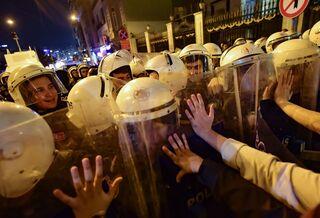
It's Sunday evening, you're sitting comfortably on the couch with a few snacks in front of you and you want to watch entertaining television. But during prime time on German television, this wish is not so easy to fulfill. At least if you don't find violence against women and sexualised violence entertaining.
As a new study on gender-specific violence on German television shows, forms of violence occur in 34 percent of the programs examined, particularly serious violence against women and children. This is the case above all in fictional offers such as crime novels. The study was initiated and funded by the MaLisa Foundation, which was co-founded by the actress Maria Furtwängler, and Ufa. They were carried out by the University of Wismar and the University of Rostock. More than 450 hours of material from 545 different fictional, informative and entertaining programs from Erste, ZDF, RTL, RTL 2, Vox, Pro Sieben, Sat.1 and Kabel eins, which were broadcast in 2020 between 6 p.m. and 10 p.m., were considered.
According to the head of the study, Christine Linke, gender-specific violence is often visible on German television, but the perspective of those affected is rarely the focus. The scientists call it a “differentiated victim perspective” when gender-specific violence is identified as such and those affected are given a chance to express their thoughts and feelings in detail. One of the results of the study is that this is only the case in 8 percent of the representations. In the vast majority, in 51 percent of the programs with violent acts, there was no victim perspective or only a marginally told one. No wonder really, since many of the women and girls are already dead in the first minutes of the film.

Just like the last crime scene in Berlin. »A young woman uses a dating app to find a suitable date in the couple Dennis and Julia. The next morning a body is found near Dennis' apartment," reads the film description in the ARD media library. A description that in no way indicates what the viewers can expect in the following 90 minutes: in addition to the murder, there is also a rape, abuse of power, physical harm and a violent son who abuses both his mother and his girlfriend behaves dominantly.
The study by the MaLisa Foundation and Ufa also criticizes the fact that so-called trigger warnings, i.e. advance notices of violent content, are often missing on German television - and obviously also in the media libraries Possibilities of prevention and offers of help are hardly communicated«. Overall, there is a need for action to discuss gender-specific violence on German television. This is because, according to the conclusion of the study, there is only seldom a sensitive handling of the complex subject.
And that's a problem. If violence against women is repeatedly made visible but hardly or not at all criticized, this contributes to the normalization of gender-based violence. Instead, representations of the structural dimension of this form of violence are needed.
It would also be desirable to address the fact that the majority of violence against women comes from their partners or ex-partners. At this point, screenwriters and directors seem to stay true to fiction. In any case, according to the study, the majority of acts of violence on German television are carried out by unknown persons. In fact, that is not the case. It's not just meeting through a dating app or walking alone in the dark park that is dangerous for women. Time to say goodbye to such stereotypical narratives.







